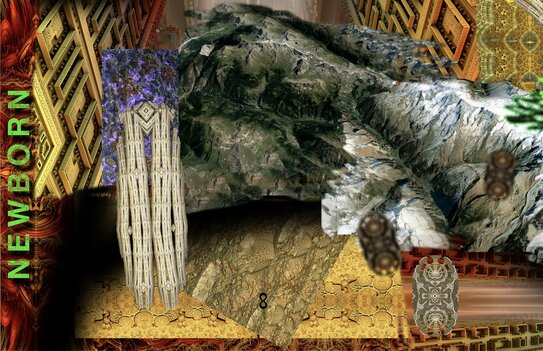Algorithmic Rituals - The Infinite Self

Susanne Kennedy und Markus Selg
10 | 03 | 2022 - 27 | 05 | 2022 Whitebox Zeppelin University
Sponsered by Fränkel Stiftung | Sparkasse Bodensee
Is
there a digital unconscious? What dreams do artificial intelligences weave?
What are the rituals and games of the algorithms that surround us?
Until
recently, hardly anyone thought that technology could also be a living organsim.
The ecosystem
of all invented things . A system that wants to multiply, be free, expand
space and be omnipresent. Artificial intelligences that wants to increase its
complexity, adapt to nature, accelerate evolution, and play the infinite game.
In the
installation “Algorithmic Rituals - The Infinite Self”, the first part of a
cycle by the artists Susanne Kennedy and Markus Selg, three robots perform a
ritual. As moving parts in a machine-like tableaux vivant, they
encounter the visitors and themselves. Their movements obey a rhythm that we
humans have created but cannot yet interpret.
In their artistic works, Susanne Kennedy (theatre maker) and Markus Selg (multimedia artist) deal with forms of post- and transhumanist coexistence, imagining worlds in which the individual is transcended, the self is boundless, and an infinite game between human and non-human actors takes its course. In a psychedelic aesthetic, multiple realities unfold like dreamlike worlds that allow visitors to explore the relationship between humans, consciousness, life and artificial intelligence, and to draw lines of connection between mythologies, programs and rites, between spirituality and technology.
Artist Biography
Susanne Kennedy (Germany, 1977) studied direction at the Hogeschool voor de
Kunsten in Amsterdam, debuted on the Dutch stage. In 2011 she was invited to
work at the Münchner Kammerspiele. For “Fegefeuer in Ingolstadt,” she was voted
Young Director of the Year by Theater heute magazine in 2013. In recent years,
she has been based at Volksbühne Berlin and Münchner Kammerspiele, produced
“Ultraworld” and “Oracles” with Markus Selg in 2020. Distorted by masks,
playback dialogue, doppelgängers and multimedia, the actors confront the
audience with the question: what does it mean to be human?
Markus Selg (Germany, 1974) is a multimedia artist exploring the
dynamics between archaic myth and computer technology in forms of digital
painting, sculpture, immersive installations, theatre and VR. He received the
Faust Award 2020 for best stage design of “Ultraworld” a collaboration with
Susanne Kennedy. He has been active across a variety of genres, including
performing art, feature films, and opera productions.
Credits
Concept:
Susanne Kennedy & Markus Selg
Spatial Design, Sound:
Markus Selg
Video:
Maths Town
Head of technical production:
Amon Ritz
Production:
Münchner Kammerspiele im
Rahmen des Festivals / in the framework of the festival “Politics of
Algorithms – Art, Life, Artificial Intelligence.”
Distribution:
Something Great
Program
The exhibition is accompanied by an extensive public program of Artist Talks, lectures, DJ Sets, workshops and student curated events. In addition a lecture series is dedicated to the topic.
15.02. – 03.05.2022
Lecture Series on the annual theme
with Prof Dr Karen van den Berg | Prof Dr Jan Söffner | Prof Dr Elisabeth Bronfen | Prof Dr Maren Lehnmann | Dr Esther Schomacher | Prof Dr Sigrid Ruby | Dr Anke Hennig & Prof Dr Armen Avanessian | Dr Philipp Kleinmichel |
Dr Niklas Maak | Felix Krell
Further Information
Responsible for the project
- Prof. Dr. Karen van den Berg | Academic Spokeswoman of the artsprogram of Zeppelin University | karen.vandenberg@zu.de
- Rahel Gloria Spöhrer | Curator of the artsprogram of Zeppelin University | rahel.spoehrer@zu.de
Open for events and on request
Telefon: 07541 6009 1302
Email: artsprogram@zeppelin-university.net
Visit by appointment




